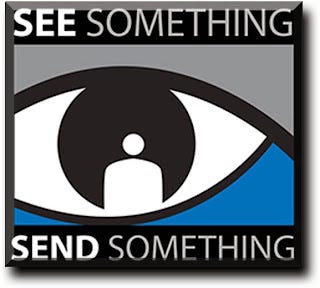A nation of spies: Police are criminalizing photography

Virginia State Police unveiled a new crime-fighting tool. It's an app for cell phones that sends photos and texts directly to police.
"My Mobile Witness began work with key law enforcement agencies in 2008 to implement technology connecting citizens and their cell phones to criminal intelligence centers nationwide. Working with various state and federal representatives My Mobile Witness has developed advanced patent pending suspicious activity reporting (SAR) technology for State Homeland Security and Major City Intelligence Centers.
The See Something Send Something system developed by My Mobile Witness connects concerned citizens, first responders and law enforcement directly to key intelligence centers throughout the United States. The system routes geo tagged suspicious activity reports and location based messaging using a patent pending methodology for storing law enforcement data and protecting citizens privacy. The system allows intelligence centers to receive, sort, search and analyze inbound SAR’s and communicate outbound across various platforms, user groups and geographically targeted locations."
Reaction to the new strategy appears to be mixed. Virginia State Police are offering an opportunity for every motorist and every pedestrian in the Commonwealth to be "eyes and ears" for suspicious or criminal activity. A new app, available for most smartphones, encourages citizens to either directly text a message to state police, or snap a picture and send it (with a message) to police. Police believe younger cellphone users are more prone to text than they are to call traditional tip lines. What do Virginia State Police want people to report using the new app? "Suspicious photography, vehicles or people in places that just look 'out of place,'" explained Maj. Rick Jenkins. AMC and Regal movie theaters are now playing a public service announcement showing a mom snapping kid pictures. She then notices a man photographing a security camera. She takes a picture of him, and forwards it to state police. The narrator in the PSA then says, "If you see it, send it. Download the app today. Protect your family. Protect your community. Protect Virginia."
Virginia State Police say all the information provided (including the identity of the tipster) is permanently deleted.
The Virginia Fusion Center, defines suspicious photography as the following:
Taking pictures or video of facilities, buildings or infrastructure in a manner that would arouse suspicion. Examples include taking pictures or video of:
* Infrequently used access points
* Personnel performing security functions
* Security-related equipment (fencing, security cameras, etc.)
The Louisiana & Pennsylvania State police have implemented the "See Something Send Something" spying program.
San Diego, St. Louis, Connecticut and many more police departments are set to join in this NATIONAL SPY ON YOUR NEIGHBOR PROGRAM!
Texas & Boston police have a text-a-tip spying program: A new program from the Laredo Police Department in Texas encourages citizens to communicate (spy) with police anonymously via text message. Spokesman Joe E. Baeza announced the creation of TIP411 this week, a program powered by web app CitizenObserver that is aimed at expanding the options citizens have to communicate with their police force.
Anyone can text authorities with information they think may be pertinent to an investigation or to report illegal activity, and police have the ability to respond to the tipster to ask for clarification or more information. Anytime the tipster wishes to end the conversation, all he or she has to do is return the text with the word “stop". Since the department involved a third party to handle the text messaging, the conversation remains completely anonymous. (a third-party or private company knows your identity, which means your identity isn't anonymous & hasn't been challenged in court) Police announced the creation of Facebook, Twitter, and YouTube accounts. "Being up to par with these social media outlets is a great venue for us to promote safety and get vital information out to the community," Baeza said. The Boston Police Department leads every other law enforcement agency in the country in the magnitude of their Twitter fan base -- nearly 266,000 followers and counting -- and has been using a “text-a-tip” program, similar to Laredo’s, since 2007.
The text-a-tip program allows Bostonians to send anonymous texts (spy anonymously) to the department's Crime Stoppers unit. Tipsters receive an automated response, and their number is then hidden by special software. The texter is also reminded later to delete the conversation thread from their phone.http://www.govtech.com/public-safety/Laredo-Police-Launch-Text-Tip-Program.html
http://www.mymobilewitness.com/company-news.php
http://photographyisnotacrime.com/2013/12/08/virginia-cops-encouraging-citizens-take-photos-citizens-taking-photos/http://www.myfoxdc.com/story/24158156/virginia-state-police-launches-new-crime-reporting-app#axzz2mph73UkB
Movie theaters join the police state conducting “random bag & jacket checks"
http://massprivatei.blogspot.com/2013/11/movie-theaters-join-police-state.html
Shopping malls are encouraging shoppers to use social media to spy on citizens:
http://massprivatei.blogspot.com/2013/11/shopping-malls-are-encouraging-shoppers.html
"See Something Send Something" audio begins at 1:49


